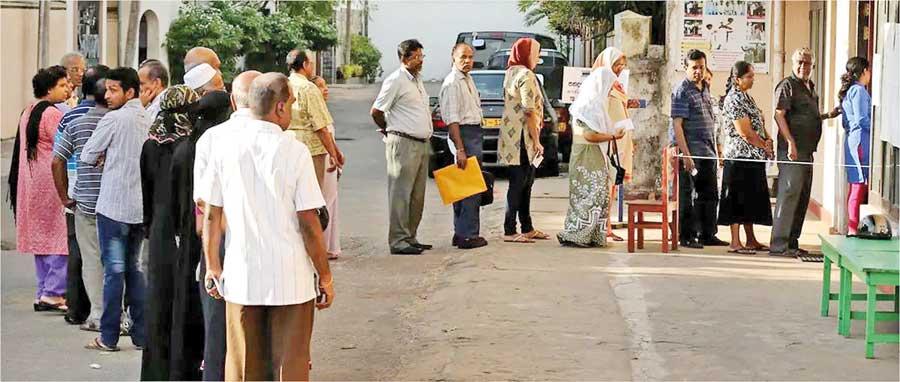Reply To:
Name - Reply Comment
Navigating Challenges and Opportunities

The future elections provide an opportunity to reaffirm a commitment to sustainable economic governance and growth. Pic Courtesy: Getty Images
Dr. Sharmini Coorey is a former director of the Institute for Capacity Development (ICD) at the International Monetary Fund (IMF) and currently a member of the Presidential Advisory Group on Multilateral Engagement and Debt Sustainability advising the Government of Sri Lanka during its economic crisis.
Monetary Fund (IMF) and currently a member of the Presidential Advisory Group on Multilateral Engagement and Debt Sustainability advising the Government of Sri Lanka during its economic crisis.
This article seeks to chart the trajectory of the Sri Lankan economic crisis and the concerning fiscal and debt sustainability outlook for Sri Lanka while also detailing policy priorities to help Sri Lanka escape this crisis, as discussed by Dr. Coorey in her talk titled “Economic Policies in an Election Year: Navigating Challenges and Opportunities”.
The crisis in Sri Lanka: Economic and political dimensions
The economic crisis in Sri Lanka, which began in 2019, is the most severe the country has faced since gaining independence in 1948. The crisis resulted in unprecedented levels of inflation, a near-depletion of foreign exchange reserves, shortages of medical supplies and an increase in the prices of basic commodities.
When the foreign currency shortage became a serious problem in early 2021, the Government tackled the issue by banning imports of chemical fertilisers, asking farmers to use locally sourced organic fertilisers, instead. This led to widespread crop failures, causing the nation to supplement its food stocks from abroad, worsening the foreign currency shortage further.
The lack of foreign exchange to import fuel to power generators led to daily power outages extending from 90 minutes to over 10 hours a day. Once seen as essentials, medicines and drugs became hard-to-find luxuries. The shortage of fuel also meant that vehicles transporting vegetables, fruit and fish could not operate thus threatening the food supply.
The crisis can be attributed to various factors, including years of economic mismanagement, tax cuts, weak governance as well as the impacts of external shocks such as the 2019 Easter bombings and Covid pandemic. Not surprisingly, what was initially an economic predicament soon spiraled into a political crisis, with Sri Lankans from every corner of the country taking to the streets, demanding the resignation of the President and his Government.
To help alleviate its dire situation, Sri Lanka sought assistance from key bilateral creditors such as India and China, receiving lines of credit to purchase food, fuel and medicines, currency support and deferred loan payments, as well as debt relief from various institutions such as the World Bank and Asian Development Bank. Despite this assistance, in April 2022, the Government announced its default, the first sovereign default in the country’s history as well as in the Asia-Pacific region. Sri Lanka eventually turned to the IMF to contain the crisis and together agreed on a comprehensive reform program to address the causes of the crisis and look after those hurt most by the crisis.
Reasons for the crisis
Sri Lanka has been facing persistent structural issues that have undermined its growth and economic progress for a significant period of time. Dr Coorey, highlighted four pillars, that are the foundation of a stable economy, that have been compromised by Sri Lanka for years, resulting in the economic crisis.
Pillar 1 – A sustainable and inclusive fiscal position:
Successive governments have failed to demonstrate fiscal responsibility. One of the main reasons for this lack of fiscal responsibility is the prioritization of short-term political gains over long-term economic stability.
Politicians implement policies that are unsustainable in the long run, such as excessive public spending on the provision of universal benefits not particularly targeted to those who need it, support of inefficient and corrupt state enterprises, and tax cuts without corresponding revenue increases.
The resulting large and unsustainable fiscal deficits are then funded by borrowing – both domestic and external - and rising interest bills financed through further borrowing leading to unmanageable public debt. To achieve sustainable development and prosperity, future governments need to prioritize fiscal responsibility and implement sound economic policies that promote long-term growth.
Pillar 2 – An independent Central Bank that is accountable for monetary and financial stability:
Sri Lanka, like many developing countries, faces numerous challenges in achieving economic stability and growth. One key factor is the need for an independent central bank that is accountable for maintaining monetary and financial stability – a protector of public money, rather than a means of financing budget deficits. A Central Bank needs to be free from political interference to maintain credibility and effectiveness and make decisions based on economic data and analysis rather than short-term political considerations. The Central Bank of Sri Lanka (CBSL) has faced many challenges in implementing monetary policy in liaison with the successive governments, as the political landscape exerts enormous pressure.
Pillar 3 - A State that refrains from commercial activity and instead focuses on fostering market competition in the private sector:
By recognising the significance of a vibrant private sector, the Government should prioritise policies promoting private sector engagement and enabling businesses, small and large, to thrive. Sri Lanka, on the contrary, has 527 State-Owned Enterprises (SOEs) most of which are grossly inefficient, loss-making, and a burden on the taxpayer. Many SOEs have fallen victim to government mismanagement and corruption, and more often than not manage to reap benefits in the form of direct subsidies and state-backed loans.
Pillar 4: An open and competitive trade regime that encourages exports, free from State intervention and the power of monopolies:
A highly competitive, export-oriented economy, providing opportunities for all to participate in economic activity, leads to innovation and economic growth. Small countries like Sri Lanka lack sizeable internal markets and have no option but to become globalized. That is how countries such as Korea, once less developed than Sri Lanka, prospered into becoming one of the top 5 exporters in the world. Fostering competition involves removing barriers to entry and price controls and deregulating the economy. Refraining from using price controls to address equity concerns and instead creating a competitive business environment and boosting supply is the best solution to lower prices in the economy.
Another root cause of the crisis is acute economic mismanagement due to the lack of a robust legislative framework to guide the country away from arbitrary economic decision making. In 2019, then-President implemented significant tax cuts that affected government revenue and fiscal policies, causing budget deficits to soar. These cuts included increased tax-free thresholds, reduction in VAT and corporate tax rates and the abolishment of PAYE tax and Nation Building tax (which funded infrastructure development).
The substantial decrease in tax revenue resulted in credit rating agencies downgrading the country’s rating, making it more challenging to acquire additional debt. To finance government spending, the CBSL also began printing money, further contributing to inflationary pressure. Despite the mounting concerns about inflationary pressure, then Governor of the CBSL announced that Sri Lanka did not need IMF relief, asserting that Sri Lanka could settle outstanding debt, thereby delaying potential solutions.

Dr. Sharmini Coorey
A transformative economic system
Dr. Coorey postulated that wide-ranging economic reforms for strong, sustainable, and inclusive growth are the only way the nation can emerge from this crisis stronger. Growth needs to be led by the private sector, market-oriented (requires the abolishment of political interference and regulations that hamper competitiveness), export-oriented (to build foreign exchange reserves and thereby service external debt, build international reserves and finance imports) and inclusive (sustained export-oriented growth requires a healthy, well-educated population with minimal poverty and inequality). Good economic governance and a stable macroeconomic environment are needed to achieve such growth.
As such, some of the suggested reform policies that should be passed in 2024 are as follows:
Better public financial management:
Enacting the Public Finance Management Law in line with IMF recommendations will help strengthen the country’s fiscal framework and improve budget formulation and execution.
A regulatory framework in the form of the Public Procurement Law should be enacted to curb corruption and malpractices in the procurement process. The current lack of a formal legislative basis for procurement has led to political interference, poor management, limited transparency, inefficiencies and resource wastage. Meanwhile, all public procurement should be moved to an e-Government Procurement System.
The “Aswesuma” social welfare programme was introduced to assist the poor of the country, replacing previous such schemes which were politicized and did not go to the true needy. With questions beginning to arise about its transparency and integrity authorities should improve the efficiency of the social safety net and address concerns transparently.
Good governance on tax policymaking:
Abolishing, the Strategic Development Projects Act and the Special Commodity Levy Act thereby bringing an end to the ability to grant tax exemptions to corporations and make arbitrary changes to commodity levies.
Establishing a single tax policy department in the Ministry of Finance to oversee all tax policies, including income tax, VAT, customs/excise duties, tax concessions and exemptions (including those permitted under the Port City Act). All tax changes should be subjected to transparent cost-benefit evaluations and mandatory approval from this department.
An overarching tax law should be passed that would require tax rates to be set according to prescribed standard schedules, abolish ministerial authority and Gazette notifications as means of changing tax rates, mandate the internationally-agreed Global Minimum Tax of 15 percent for all corporations and provide the legal framework for the Ministry of Finance’s single tax policy department
Fully digitalising tax collection and ensuring the Revenue Administration Management Information System (RAMIS) is fully and seamlessly functioning.
Ensuring that the Large Taxpayers Unit and the new High Net Worth Individuals Unit of the Inland Revenue Department are adequately staffed and employees of finance and IT departments are empowered through salaries, bonuses and benefits in line with private sector counterparts.
Passing a Tax Administration Act for stronger tax administration, including criminal penalties for tax evasion and bribery.
Other key reforms:
Maintaining the independence of the CBSL: The Central Bank Act of 2023 was a step in the right direction. It is a legal framework promoting good governance, with an aim at bolstering the bank’s independence and accountability while maintaining price stability in the country and depoliticizing decisions on monetary policy.
Passing the SOE Reform Law implementing the cabinet approved SOE Reform Policy that Cabinet approved last year. This would ensure that SOEs have independent and professionally-run Holding Companies and an Advisory Committee appointed to recommend Directors to the Board, bringing them under the Ministry of Finance (like Temasek Holdings, the Singaporean state-owned conglomerate)
Privatization of SOEs needs to proceed without delay to create space for private sector growth and shift government spending away from loss-making enterprises and towards social spending and growth-enhancing public investment.
Elimination of domestic price controls and unnecessary regulation and anti-competitive practices
Despite the challenges ahead, with wise monetary and fiscal choices and firm and responsible leadership, Sri Lanka can move towards an economically resilient and prosperous future. The forthcoming elections provide an opportunity to reaffirm a commitment to sustainable economic governance and growth.